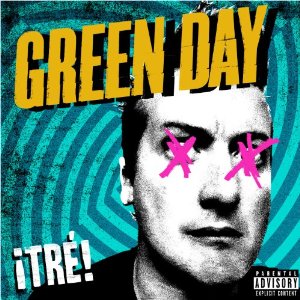Album Review: Green Day ‘¡Tre!’
 |
If we’re being honest, the first two installments in Green Day’s back-to-basics trilogy, ¡Uno! and ¡Dos!, did not differentiate themselves enough to warrant the ambition of the band in releasing their music this way. ¡Tre! is where they absolutely have to prove that three albums were necessary, to make up for the heaps of filler thrown to the masses with the first two volleys.
‘Brutal Love’ opens the album with Green Day’s interpretation of doo-wop, and it’s one of the strongest tracks of the entire trilogy. The band is adept at manipulating their sound to mix with just about any genre or style, and they seldom if ever fail when they do it. The trouble is that, as evidenced by ¡Dos! and its 70s-singalong opener, the boys seem to struggle with keeping unique qualities from petering out over the course of a record.
You can’t just open with a sound that is a bit different and then play 11 songs which are indiscernible from American idiot, and have the audacity to claim it is a new direction or a great step in the band’s evolution. That is exactly what they have done up to this point, and it has resulted in one or two standout tracks for each disc in the set while the lion’s share of songs feel almost completely unnecessary.
‘Missing You’ is about as typical a Green Day tune as might be possible, dashing my personal hope that their stylistic exploration could last more than one track. It seems like Green Day has a default setting that even they are tired of, but they push themselves to try new things– to great success! The problem is that they have to push so hard to do it, and when they lean back on their hands the music finds its way right back to center.
From here to the tenth track it feels like nothing important happens at all. The songs bleed together, they lack energy and all feel slightly slowed down. ‘Drama Queen’ shows potential, but it’s all stripped away with both hokey lyrics and production. The only song to really try to grab the listener’s full attention is ‘Sex, Drugs and Violence’, but it winds up being remarkably tame for a song boasting that sort of title. If the main thing that differentiates this album from the previous two is that it is somewhat boring, it is a rousing success. Up to this point it feels like ¡Tre! is the weakest of the three releases.
As I listened to the record I was left feeling confused by the way things were going. It’s not that any of this is objectively terrible, but this isn’t what the band wants to do or what they appear to think they are doing. They went into a room together to work out some music that was raw, a bit different, and personal. What they came out with however were 37 songs that seem highly formulaic, sound exactly like their back catalog, and could have been written by a committee. There is a massive disconnect between the way the band thinks and speaks of their music and what they actually put out.
‘Dirty Rotten Bastards’ brings a bit of life to the record, with just two more songs to go. The song lies somewhere between an older breed of punk rock and a sea shanty, and it manages to make full use of its six and a half minute runtime. Up to this point it is the best they have offered, and this one song, considered on its own, achieves everything the band set out to do. This is pop-punk with a worthy twist, and it feels like the sort of thing Green Day should be spending their time on.
Following that refresher on what the band’s strengths really are, ‘99 Revolutions’ comes across as an excellent addition to their catalog. If there were a few more songs like it on ¡Tre! this one would likely fail to resonate, but with the lull that is the very broad and dreary center of this record the final three tracks are refreshing, and validating of Green Day’s style.
The closing track is ‘The Forgotten’, a beautiful piano ballad with a simple chord progression that would be a hit single in just about any era under the right circumstances. Billy Joe sings of the passage of time in simplistic poetry, knowing exactly how to close a record. Or three of them.
Every single time that an artist or a band puts out a double album, or in this case a three album set of 37 songs, the question has to be asked: Would this have been a whole lot better if they took the ten best tracks and put all of their energy into that single disc? The answer is yes, definitely, without a doubt, one thousand times yes. There are great moments, and the final three tracks of ¡Tre! may be the strongest section of all, but there are just too many flaws, lulls, and skippable tracks to say that anyone needs all 37 songs. Worse, the three albums do not feel as if they each have a well defined soul of their own, as if songs from any of them could be swapped without making much if any difference. So what was the point?
Even the good songs are going to be that much more forgettable because they came as a part of a massive onslaught of music which conditions the listener not to really care or pay attention. It wouldn’t take a lot of trimming to turn this collection into one of Green Day’s best albums, but the band’s ambition, and maybe their collective ego, might have gotten the better of them here.
Release Date: December 11, 2012
Image Courtesy of Reprise
